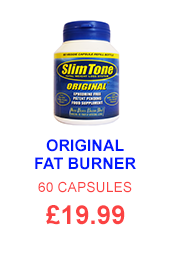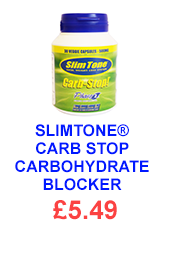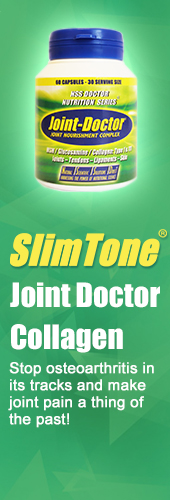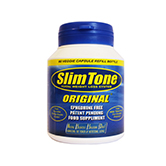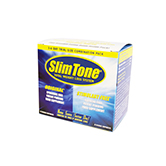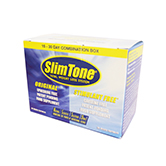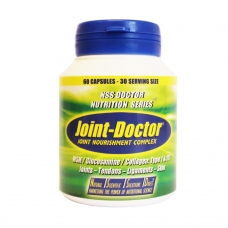Joint Doctor® Collagen
Availability: In Stock
STOP OSTEOARTHRITIS IN ITS TRACKS AND MAKE JOINT PAIN A THING OF THE PAST!
Based on European clinical studies Joint Doctor will help replace the collagen that is lost via ageing and injury. JOINT DOCTOR® COLLAGEN help to restore joint function; significantly reducing pain and improve mobility whilst nourishing tendons, ligaments and skin.
Please Note: We will dispatch bottle/bottles containing the capsule equivalent of your order. See invoice for details.
Take 1-2 capsules 3 times daily with a glass of water on an empty stomach. For optimum results do not take with any other protein powders/supplements. Wait 30 minutes before eating or take all 6 on an empty stomach before bedtime. A 5-10 gram daily dose taken over a 1-3 month period will dramatically replenish your natural collagen levels, leading to a number of welcome physical benefits.
 |
| STOP OSTEOARTHRITIS IN ITS TRACKS AND MAKE JOINT PAIN A THING OF THE PAST! |
Nutrition and Joint Health
Osteoarthritis is a progressive, degenerative joint disease characterised by a breakdown of the joint's cartilage (tough, flexible connective tissue), causing bones to rub against one another, which may lead to loss of movement and pain. Degenerative joint diseases have many causes including normal wear and tear of the cartilage with age, overweight or obesity, acute or chronic stress to the cartilage, joint abnormalities or misaligned joints and infectious or neuropathological changes.
A focus on weight management and the nutrients beneficial to joint health may help in the fight against joint diseases. The United States may be particularly vulnerable to joint trauma from overweight and/or obesity, since 64% of all American adults are either overweight or obese, with numbers expected to rise dramatically within the next decade. In addition, physiology of the body's joints shows that obtaining a balanced diet that contains dietary protein, vitamins C and D, and minerals, calcium and phosphorus can contribute to normal development of the cartilage and joint tissues required for healthy movement.
Though additional clinical research is necessary to identify efficacy of various dietary supplements, accumulating research on beneficial nutrients and their association with joint health brings several to the forefront. One of the more promising supplemental nutrients to date is collagen hydrolysate. Collagen is the most abundant protein in the body and gives structure to tendons, cartilage tissue, bones and connective tissue; collagen hydrolysate (CH) is collagen derived from animals and is similar in composition to that found in human cartilage.
Why is collagen hydrolysate helpful for osteoarthritis?
Research suggests that CH can stimulate the synthesis of collagen, which is important for maintaining healthy joints. Steffen Oesser, PhD, of the Department of General Surgery and Thoracic Surgery, University of Kiel, Germany, provided a summary of CH findings as presented at the conference. In order to determine whether CH can, in fact, reach and affect the joint tissue, scientists at the University of Kiel studied the absorption rate and accumulation levels of collagen hydrolysate in subjects by monitoring its uptake in the body. Results indicated that upon rapid intestinal absorption of supplemental CH, subjects experienced a doubling in the quantity of the nutrient accumulated within their cartilage tissue as compared to the control group. The findings imply that CH does reach the tissue and long-lasting accumulation is possible.
The next phase of the research was to determine whether CH may positively affect the joint tissue once it has accumulated. This would require one of two actions to take place: inhibition of the degradation of the supportive joint tissue and / or stimulation of new cartilage cells to compensate for naturally degraded tissues. In a cell culture model, researchers have been able to demonstrate that the presence of CH in the culture stimulated collagen production. When compared with collagen that is naturally present in the cells, the native collagen did not lead to this stimulatory effect. The supportive joint tissues were also stimulated to reproduce when in the presence of CH, implying that CH may be able to reduce degenerative changes in the joint tissue. Dr Oesser highlighted that, "These are significant findings because we are beginning to learn that collagen hydrolysate is not only reaching the targeted joint tissue, but we are able to observe that its presence can also create a positive change in the joint."
Additionally, Hans-Konrad Selbmann, PhD, from the German University in Tuebingen, presented the findings from his review of the literature on collagen hydrolysate and its effect on joint health. Among his research, including 16 clinical studies, two within the last decade stand out as highly significant double blind, placebo controlled clinical studies. The first was a study from 1991 by Adam, et al., which compared four treatments (CH gelatine, a gelatine-glycine-calcium-fluid combination and albumin proteins) to reduce the patients' levels of pain and their need for pain medications.
The study found that all three of the gelatine treatments were effective and significantly superior to the protein supplementation.
Where can collagen hydrolysate be found? How much is recommended?
Collagen hydrolysate is a special type of gelatine with particular physiological role and is produced directly from collagen. There are currently no official dietary guidelines or recommendations for quantity of collagen hydrolysate that will benefit health. However, based on research, a benefit has been shown by taking 10gms of collagen hydrolysate for at least three months. Because of the constant break down and regeneration of collagen, research shows that if people stop taking collagen hydrolysate altogether, the symptoms may reoccur.
Collagen hydrolysate may benefit those at risk of degenerative joint disease, and particularly osteoarthritis. Such at-risk populations include older individuals, especially those over the age of 50; individuals who are overweight; individuals whose occupational activities predispose them to osteoarthritis, including athletes and those involved in mechanical stress on cartilage.
The Osteoarthritis Research Society International (OARSI) organises the 2003 World Congress in Osteoarthritis.
Impact of Collagen Fragments on the Extra cellular Matrix Metabolism
Steffen Oesser, PhD
Surgical Research
Department of General Surgery and Thoracic Surgery
University of Kiel, Germany
Consensus exists that the therapeutic goal of causal treatment of osteoarthritis can only occur by targeting chondrocytes metabolism to counteract the catabolic processes taking place in the joint cartilage. In principle, two therapeutic concepts are conceivable: inhibiting the degradation of the structural macromolecules in the extra-cellular matrix (ECM) or stimulating the biosynthesis of cartilage cells to compensate for pathologically caused degradation of the ECM.
Experimental investigations have demonstrated intestinal absorption of collagen hydrolysate (CH) in its high molecular form with peptides up to 10kDa as well as a preferential accumulation of these CH derived fragments in cartilage tissue (Oesser et al. 1999).
In recent studies the influence of CH on the metabolism of mature chondrocytes has been investigated in a primary cell culture model (Oesser and Seifert 2003). It was shown that the presence of CH in the culture medium led to a dose-dependent increase in type II collagen biosynthesis, whereas native collagen as well as collagen-free hydrolysate failed to stimulate the production of type II collagen in chondrocytes. These results clearly indicate a stimulatory effect of CH on the type II collagen biosynthesis of chondrocytes and suggest a possible mechanism for the regulation of collagen turnover in cartilage tissue.
Moreover, utilizing immunocytochemical methods, it was demonstrated that in addition to an enhanced synthesis of type II collagen in chondrocytes treated with CH, the amount of pericellular aggrecan was significantly increased as well, indicating that the stimulated cells synthesise a complete extra cellular matrix.
Based on these results CH might be of particular importance for the nutrition of cartilage tissue and might help to reduce degenerative alterations in the ECM.
Literature
Oesser, et al. Oral administration of 14C labeled gelatine hydrolysate leads to an accumulation of radioactivity in cartilage of mice. Journal of Nutrition 1999; 129: 1891-1895.
Oesser, Seifert. Stimulation of type II collagen biosynthesis and secretion in bovine chondrocytes cultured with degraded collagen. Cell & Tissue Research 2003; 311:393-399.
Speaker Biography
Steffen Oesser, PhD
Surgical Research
Department of General Surgery and Thoracic Surgery
University of Kiel, Germany
Steffen Oesser studied biology and chemistry at the University of Kiel in Germany. As a Scientific Assistant at the Institute for Physiology of the University of Kiel, he initially concentrated on the areas of cell physiology and protein chemistry. Since 1993, Dr Oesser has been active in medical research at the Schleswig-Holstein Hospital. Subsequent to his doctoral theses on the influencing of chondrocytes metabolism, he has been principally involved in researching the pathophysiology of osteoarthritis and the development of new therapy possibilities for the treatment of degenerative disease of joint cartilage.
Nutritional Intervention for Joint Health
Berlin, Germany 17th October 2003
There are nearly 70 million people in the United States affected by arthritis and related joint health conditions. Health experts estimate that there will be a dramatic increase in the prevalence of joint disease over the next 20 years as the population of Americans living beyond their 70s is expected to double. Degenerative joint diseases, such as osteoarthritis (OA), have many causes but there are currently no cures, only palliative treatments to reduce pain and disability. It is therefore prudent to examine promising and relatively inexpensive interventions - including nutrients and proteins such as collagen hydrolysate - that may help slow down the onset of disease, improve symptoms and delay disease progression.
To recognise the advances in nutrition research (and OA) and discuss its relevance, health care professionals specializing in joint health gathered at an educational session titled, "Role of Collagen Hydrolysate in Cartilage Metabolism and Regeneration" at the eighth annual World Congress on Osteoarthritis held in Berlin, Germany. To recognise the advances in nutrition research (and OA) and discuss its relevance, health care professionals specialising in joint health gathered at an educational session titled, "Role of Collagen Hydrolysate in Cartilage Metabolism and Regeneration" at the eighth annual World Congress Osteoarthritis held in Berlin, Germany.
The Role of Nutrition in Joint Health
Kristine Clark, PhD, RD, FACSM
Director of Sports Nutrition, Penn State Orthopaedics
The Pennsylvania State University
Osteoarthritis (OA) is a progressive, degenerative joint disease characterized by a breakdown of the joint's cartilage, causing bones to rub against one another, which may lead to loos of movement and pain.
Degenerative joint diseases have many causes including normal wear and tear of the cartilage with age, overweight or obesity, acute or chronic stress to the cartilage, joint abnormalities or mal-aligned joints and infectious or neuropathlogical changes. OA affects nearly 21 million Americans. It is the most common type of arthritis; almost all individuals show signs of mile OA by the time they reach age 70. Currently, there is no medical cure for OA, only treatments to alleviate pain and symptoms. Accumulating evidence indicates that promising preventative measures such as nutrition may help slow down the onset of disease, improve symptoms and delay disease progression.
The diet of an individual can therefore play a critical role in the prevention of disorders that can influence joint disease. Food choices that offer optimal levels of calcium, vitamin C, protein, phosphorus, and vitamin D contribute to normal formation of the extra cellular matrix and articular cartilage required for healthy joint movement. In addition, weight management would help reduce any negative impact on the joints. In the United States alone, 64% of all adults are either overweight or obese. By the year 2008 obesity alone is predicted to reach 39% of all U.S. adults and 26% of children.
Though more clinical research is needed to determine the level of efficacy of various dietary supplements on improving measures of joint disease, research results on many have also shown promise. Ingredients such as omega-3 and omega-6 fatty acids, ginger and glucosamine with chondroitin sulphate are shown to relieve some degree of discomfort with joint stiffness, pain and inflammation. In addition, studies suggest that collagen hydrolysate, safe for use in food and gelatine supplements, may positively influence articular cartilage regeneration and support OA therapy.
Speaker Biography
Kristine Clark, PhD, RD, FACSM
Director of Sports Nutrition, Penn State Orthopaedics
The Pennsylvania State University
Dr. Kristine Clark is the Director of Sports Nutrition for Pen State University's Athletic Dept. where she counsels over 800 varsity athletes from 29 teams. In addition, she advises head coaches, team physicians, athletic trainers, strength and conditioning coaches, and athletic administration on policies regarding eating disorders, weight management, and supplement use among athletes.
While most of Dr. Clark's time is devoted to athletics, she also holds a faculty position as an assistant professor in the Department of Nutrition at Penn State teaching a course titled, "Nutrition for Exercise and Sport".
Dr. Clark was appointed to the Sports Medicine Advisory Board of the United States Olympic Committee in 1999. She began working as the nutritionist for the United States Women's Soccer Team in 1995 and continues as the Sports Nutritionist for the United States Soccer Federation, which includes all Olympic Develop Teams for female soccer players (5 age divisions). Dr. Clark advised the under 19 Women National Team and coaches as their nutritionist during the first ever World Cup event for this age group, which they won September 2002.
Dr. Clark holds a PhD in Nutrition Science from Penn State University, a MS degree in Health Education from the University of Wisconsin, and a BS degree in Nutrition and Dietetics from Viterbo College, LaCrosse, WI. Her research interests include food choices, timing of eating, athletic performance, and weight management. Currently, she is conducting a study on pre-exercise snacks and perceived benefits on running. Clark, a registered dietician, is a past president of the American Dietetic Association's practice group of Sports Nutritionists, a Fellow in and Trustee Member of the American College of Sports Medicine, and a frequent lecturer at national health, fitness and nutrition conferences throughout the United States. In addition, Clark serves as one of five spokespersons for the International Food Information Council and as such provides nutrition, exercise and fitness information to the media on a daily basis.
Suggested mechanism of collagen hydrolysate in joint function
CH essentially has the same amino acid composition as collagen in the joint cartilage thus making it a viable stimulus for collagen production and therefore cartilage regeneration.
In the spring of 2003 scientists from the German University Hospital of Kiel, for the first time, published evidence that collagen hydrolysate stimulates collagen synthesis in cartilage cells. In this study they added bovine chondrocytes - the cells responsible for generating cartilage - to a cell culture medium enriched with collagen hydrolysate. After three days a dose-dependent increase of collagen synthesis was observed and the CH treated cell cultures revealed a 2.5 fold higher increase in collagen stimulation compared to that of control cells.
This is the first time a cell culture model has shown that the presence of CH leads to an increase in cartilage formation and provides a scientific rationale for the improvements seen in clinical studies.
Treatment of osteoarthritis with collagen hydrolysate
Osteoarthritis is characterised by an imbalance between the generation and degradation of cartilage in the joint that yields to greater wearing away than production of the cartilage. Different causes for the imbalance have been cited such as the aging process, increased body weight, severe mechanical and repetitive strain or a developmental abnormality. Despite decades of research there is still no cure.
Joint degradation begins when people are in their 20s and 30s and affects most people by the age of 60. The number of people with degenerative joint and bone diseases is expected to increase because among other things, people are living longer and weighing more.
Osteoarthritis is the most common form of degenerative joint disease in the world. In the United States, it is estimated that eight million people have arthritis, osteoarthritis being the most common.
Natural prevention of osteoarthritis
Collagen hydrolysate is a nutritional supplement, which may be able to benefit people who suffer from osteoarthritis. While there are no official recommendations yet, scientific research suggests that 10gms of CH per day for at least three months has been beneficial. Research also shows that symptoms may reoccur if use of the supplement is discontinued.
Proven safety profile
As CH is free from cholesterol, saturated fatty acids and purines, it offers an ideal supplement profile. Collagen hydrolysate was awarded GRAS status (Generally Recognised As Safe) in 1999 by the U.S. Food and Drug Administration (FDA) confirmed in July this year again, which affirms its safety for long-term use in degenerative joint diseases.
Joint Health and Osteoarthritis: The Facts
Healthy Joint Function
A normal joint is where one bone moves on another. Ligaments hold the two bones together, and work like elastic bands to keep the bones in place while muscles lengthen and shorten to make the joint move.
Definition
A coating of cartilage covering the bone surface stops the bones from running directly against each other. This helps the joint to work smoothly.
The joint cavity contains fluid, which provides nutrients to the joint and cartilage.
Degenerative Joint Disease
Osteoarthritis is a progressive, degenerative joint disease characterised by a breakdown of the joint's cartilage, causing bones to rub against one another, which may lead to loss of movement and pain.
The hands and weight-bearing joints such as spine, knees and hips are most affected.
Causes
- Wearing away of the cartilage with increasing age
- Being overweight
- Acute or chronic trauma to the cartilage or tissue surrounding it (e.g. repeated and significant mechanical stress)
- Mal-aligned joints
- Infectious, metabolic, endocrine or neuropathological changes
- Congenital joint abnormalities
- Genetic factors
- Disease processes that alter normal structure of the cartilage (e.g. gout)
Symptoms
- Pain when beginning a movement ("warm-up pain")
- Pain upon exercise
- Restricted movement
- Feeling of tension and stiffness in the joints, particularly in the morning
- Swollen joints
- Tension in muscles and tendons
- Grinding of the joints
- Increasing instability in the joint with local pain

Epidemiology
- Osteoarthritis is the most common type of arthritis, especially among older people.
- Almost all people by age 40 have some pathological changes in their weight bearing points.
- By the time people reach age 70 almost all individuals show signs of mild osteoarthritis.
- Osteoarthritis affects nearly 21 million Americans, mostly after age 45; women are more commonly affected than men.
- 80% of people with OA report some form of limitation in movement or activities.
Diagnosis
Symptoms of the disease
Joint degradation confirmed by X-ray
Osteoarthritis is currently incurable. Treatments focus on reduction of pain, inflammation and improving joint movement to delay by a variety of interventions. For example:
Treatment
- Weight reduction
- Rehabilitation to keep joints flexible and improve muscle strength
- Optimisation of overall physical fitness via exercise (range of motion, postural, strengthening, stretching)
- Non-steroidal anti-inflammatory drugs (NSAIDS)
- Aspirin and analgesics for anti-inflammatory effect
- Heat and ice treatment for temporary pain relief
- Steroid injections into the joint to reduce inflammation
- Surgical intervention to relieve pressure on joints or replace
- Natural products like Joint Doctor collagen complex
Additional Information
WHO has declared this decade (2000 - 2010) the "Bone and Joint Decade" in an effort to focus resources on addressing the epidemic of osteoarthritis and other major conditions affecting this area.
New highlights from research on gelatine - Natural prevention of osteoarthritis possible
Eberbach, Germany, 22 April 2003. Scientific studies and clinical experience from past decades have demonstrated gelatine has a protective effect on articular cartilage. For the first time cell researchers have been able to prove in a laboratory study that gelatine stimulates collagen synthesis in cartilage cells. The results from this study confirm the importance of gelatine in the prevention and treatment of degenerative arthritic disease.
Scientists have been investigating the effect of gelatine on cartilage metabolism for many decades. In clinical studies based both in Germany and internationally, patients reported a significant reduction in pain following the intake of collagen hydrolysate, one of the types of gelatine suitable for therapeutic use. Further more, analgesics and anti-inflammatory agents were not taken as often and joint mobility increased.
Advances in collagen hydrolysate research
The physiologists Dr Oesser and Professor Seifert from The University of Kiel have been able to explain the physiological basis for these observations in their recently publicised laboratory study (Cell Tissue Res (March 2003) 311: 393-399) on freshly isolated chondrocytes from cartilage. The enrichment of the cell culture medium with collagen hydrolysate led to a significant stimulation of the synthesis of collagen in cartilage cells. In the experiment, mature bovine chondrocytes were preincubated in the basal cell medium for three days. Then the medium was replaced with a medium supplemented with collagen hydrolysate and the controls were replaced with a medium containing no collagen or a medium with collagen free protein hydrolysate and incubation was continued for eight days. The scientists measured the synthesis of collagen in the medium using immunocytochemical detection and by demonstrating the formation of istopically labelled amino acids. The results confirmed that the addition of collagen hydrolysate to the culture medium led to an up to 2.5 fold dose dependent increase in the secretion of collagen, which could not be demonstrated in the controls. The results reveal a possible mechanism for the complex regulation of collagen turnover in the joint. According to these results collagen degradation products stimulate collagen synthesis in a positive feedback mechanism and induce the formation of new cartilage tissue.
Prevention and treatment of osteoarthritis with collagen hydrolysate
The current observations made by the researchers are a further building block in the chain of evidence that specific intake of collagen hydrolysate in the daily diet makes good sense in the prevention and treatment of degenerative joint diseases such as osteoarthritis. "It is very plausible that collagen hydrolysate, when taken as a supplement to our normal diet, may activate the synthesis of collagen in cartilage. Particularly in situations in which cartilage is under massive stress the intake of collagen hydrolysate could be highly significant medically and reduce degenerative changes," concludes Dr Steffan Oesser.
The same conclusions have also been drawn by other leading researchers such as the American arthritis specialist Professor Roland Moskowitz and the Prague based rheumatologist Professor Milan Adam, who is considered to be the 'father' of collagen hydrolysate research. Professor Moskowitz and Adam also advocate the daily intake of collagen hydrolysate based on the results of their studies. Collagen hydrolysate is important as a dietary supplement particularly in patients with osteoarthritis or in people whose joints are put under heavy stress such as sportsmen/women or people who are overweight. The recommended daily dose is 5-10 grams Collagen hydrolysate's good safety profile - the FDA awarded collagen hydrolysate GRAS status (Generally Recognised as Safe) in 1975, - makes it particularly interesting as a long term treatment in the prevention and treatment of degenerative joint disease.
 |
| STOP OSTEOARTHRITIS IN ITS TRACKS AND MAKE JOINT PAIN A THING OF THE PAST! |
How does Joint Doctor work?
Joint Doctor® Collagen complex works by repairing damaged cartilage and almost completely stops further deterioration. Joint Doctor will also cause collagen producing cells in the body to increase their natural production of collagen up to levels only usually experience by those under 25 years of age.
What will this mean for the user?
A vastly improved range of mobility and greatly reduced pain levels.
Reduced pain levels, it must be full of painkillers. Is Joint Doctor® collagen complex dangerous?
No! Joint Doctor® Collagen Complex capsules are completely safe and contain only natural ingredients. Long term use of even non prescription analgesics has been shown in scientific studies to cause long term damage to vital internal organs. The pain relief that has been reported by thousands of satisfied Joint Doctor users is caused by the development of fresh new cartilage that naturally cushions your joints leading to smooth pain free joint movements.
Sounds too good to be true. Is there any scientific proof of its effects?
Yes! Joint Doctor's® primary active ingredient has been extensively researched and validated. Professor R Moskowitz, director of the Arthritis Institute, university of Cleveland, USA, conducted research on 300 osteoarthritis patients. The multi centered trials showed a significant reduction in pain and an improvement in Joint mobility in the group taking Joint Doctor® Collagen Complex. The researchers also investigated the effect of Joint Doctor Supplementation on the collagen producing cells in the body (chondrocytes) and indicated an increase in production of over 250%!
I use medication, can I still use Joint Doctor® collagen complex?
Yes! Joint Doctor® Collagen Complex is completely natural and free from any side effects and therefore will not react with most forms of medication, however, we strongly recommend that an assessment is made by a medical professional or doctor before anyone taking prescription medication, uses our formulation.
I don't suffer from osteoarthritis, but I do participate in sports regularly and often experience the painful effects of stiff joints. Will Joint Doctor® Collagen Complex benefit me?
Yes! Thousands of sportsmen and women regularly use Joint Doctor® Collagen Complex to naturally increase their production of joint cushioning collagen. Sports men and women using Joint Doctor have reported a much lower instance of joint stiffness and greater recovery from workouts. This injury preventative supplement will ensure your joints remain strong, supple and withstand the great demands that competitive exercise places on the body. There have been many reports of old, long standing injuries simply 'clearing up' with the regular use of Joint Doctor® Collagen Complex.
That sounds great! How many capsules do I need to take per day?
Take 1-2 capsules 3 times daily with a glass of water on an empty stomach. For optimum results do not take with any other protein powders/supplements. Wait 30 minutes before eating or take all 6 on an empty stomach before bedtime. A 5-10 gram daily dose taken over a 1-3 month period will dramatically replenish your natural collagen levels, leading to a number of welcome physical benefits.
Why take a collagen hydrolysate supplement?
The stress placed on our joints means that they are prone to damage in the longer term. Cartilage is worn out and sometimes even lost. Unfortunately the body is sometimes unable to product sufficient new cartilage to counteract this loss. By taking a collagen hydrolysate supplement we can provide our body with the essential building blocks needed for the formation of joint cartilage.
Collagen hydrolysate is used as a nutritional supplement for the prevention and treatment of degenerative diseases like osteoarthritis.
How quickly will I notice a difference?
Acute pain, morning stiffness and restriction of articular function are symptoms of degenerative diseases like osteoarthritis. Patients taking 5-10 grams of collagen hydrolysate per day see significant improvements after 6 to 12 weeks.
If taken preventatively, 5-10 grams of collagen hydrolysate per day will reduce the risk of degenerative disorders.
Why is collagen hydrolysate specifically important for cartilage in comparison to other proteins?
The amino acid composition of collagen hydrolysate corresponds exactly to that of collagen - the predominant protein in cartilage.
Does collagen hydrolysate have any other benefits?
As well as improving joint mobility people have reported a gain in hair thickness and quality of skin and nails.
Which persons can benefit from collagen hydrolysate?
Collagen hydrolysate is an ideal nutritional supplement for anyone wanting to stay fit and well or who want to reduce risks of degenerative joint disease by constitutional nutrition. Collagen hydrolysate administration has an important role for use in individuals at risk from the development of joint degeneration. Such at-risk populations include older individuals, particularly those individuals aged 50 years and older; individuals who are overweight; individuals whose occupational activities predispose to osteoarthritis, including jobs involving repeated knee-bending (e.g. carpenters, floor layers, and painters), textile workers, miners and dock workers; individuals participating in extensive non-occupational physical activities including recreational runners/walkers, cyclists, gardeners, soccer/football players; individuals with a past history of significant joint injury such as fracture or ligamentous injury; and individuals with a family history suggesting a genetic predisposition to osteoarthritis.
Basic questions on collagen and collagen hydrolysate
What is cartilage?
Cartilage is a tough, flexible tissue that consists of chondrocytes (cartilage cells) and matrix (collagen and proteoglycans).
What is collagen?
Collagen is the most abundant protein in the human and animal body representing 30% of total body protein. Collagen gives the structure to tendons, cartilage tissue, bones and connective tissue.
The collagen molecule is formed by 3 intertwined protein chains building a triple helix structure (with a molecular weight of ~300kD). The triple helix structure of collagen is responsible for the strength and flexibility of cartilage tissue.
The amino acid composition of collagen includes 30% glycine and 25% proline and hydroxyproline. These amino acids make collagen different from other proteins and are of great importance for collagen synthesis.
What is collagen hydrolysate?
Collagen hydrolysate is collagen (from skin, bone, cartilage) broken down by a natural process (hydrolysis) to facilitate easy absorption into the blood stream.
Since collagen hydrolysate has the same amino acid composition as collagen it is an ideal component for cartilage regeneration. Collagen hydrolysate stimulates collagen synthesis: this effect was proven by a laboratory study by Oesser et al. (Cell & Tissue Research 311:393-9; March 2003)
Clinical studies with patients suffering from osteoarthritis revealed the positive effect of collagen hydrolysate on joint health (e.g. pain reduction, reduced medication, improved physical function). The beneficial effect of collage hydrolysate on osteoarthritis is patented (European patent no. 0254289 Agents for the treatment of osteoarthritis, 1986, based on a study by Prof Adam.)
Collagen hydrolysate received GRAS status (Generally Recognised as Safe) by the US Food and Drug Administration (FDA).
Due to its special production process collagen hydrolysate does not set and is soluble in cold water.
What is the difference between collagen, collagen hydrolysate and gelatine?
Collagen is the most abundant protein in the human and animal body representing 30% of total body protein. Collagen gives structure to tendons, cartilage tissue, bones and connective tissue.
Gelatine is produced from collagen. It has gelling properties and is used in the food industry (e.g. as emulsifier, gel-former, taste and colour enhancer), in the pharmaceutical industry (e.g. for capsules, as blood replacement, agent for vitamin coating) and in the photo industry (e.g. as basis of film and photographic paper).
Collagen hydrolysate is also produced from collagen but by a different process. The amino acid compositions of collagen and collagen hydrolysate are very similar. This similarity gives collagen hydrolysate an important role in the build up of new cartilage. Research has shown that collagen hydrolysate stimulates collagen synthesis: this effect was proven by a laboratory study by Oesser et al. (Cell & Tissue Research 311:393-9; March 2003).
Clinical studies with patients suffering from osteoarthritis revealed the positive effect of collagen hydrolysate on joint health (e.g. pain reduction, reduced medication, improved physical function). The beneficial effect of collagen hydrolysate on osteoarthritis is patented (European patent No 0254289 Agents for the treatment of osteoarthritis, 1986, based on a study by Prof. Adam).
Collagen hydrolysate received GRAS status (Generally Recognised as Safe) by the US Food and Drug Administration (FDA).
Questions on the production of collagen hydrolysate
What raw material is used?
Collagen hydrolysate is manufactured from bovine or porcine sources by using only selected raw material from healthy animals that have been approved by the veterinary authorities for human consumption.
How is collagen hydrolysate produced?
Collagen hydrolysate is extracted from the bovine or porcine material using a multi-state extraction process; it is then purified, concentrated, sterilized and dried. This results in cold water soluble powder of collagen hydrolysate.
When was the beneficial effect of collagen hydrolysate first discovered?
In the Middle Ages Saint Hildegard of Bingen (12th century; 1098-1179) described the beneficial effect of calf cartilage broth on joint pain.
Since 1980 scientists of different medical disciplines have strengthened their R&D activities in the field of both cartilage metabolism and the effect of collagen hydrolysate on joint health.
Has there been any research done on collagen hydrolysate?
There have been medical observations, key laboratory and clinical studies carried out over the past 20 years by internationally leading experts of different medical disciplines.
All clinical studies reveal positive effects of collagen hydrolysate on joint health, especially on osteoarthritis, for example:
- Significant reduction of pain
- Reduced need for analgesics
- Improvement of joint mobility
In 1986, the beneficial effect of collagen hydrolysate on osteoarthritis was patented (European patent No 0254289 Agents for the treatment of osteoarthritis).
In spring 2003 Oesser et al published a laboratory study that could explain the potential basic mechanism of the clinical observations. Scientists were able to demonstrate that collagen hydrolysate stimulates collagen synthesis in cartilage cells (chondrocytes).

What are the most important studies on collagen hydrolysate?
Furthermore Prof. Roland Moskowitz, Director of the Arthritis Research Institute, Cleveland/USA conducted an international study (USA; UK; Germany) with 390 patients suffering from osteoarthritis.
The most extensive research was carried out by Prof. Milan Adam, Professor of Rheumatology at the University of Prague, which led to the issue of a European patent, No 0254289 Agents for the treatment of osteoarthritis.
Both studies reveal the positive effects of collagen hydrolysate on joint health, especially on osteoarthritis.
Dr Steffen Oesser, physiologist at the University of Kiel, Germany published key studies on cartilage metabolism and regeneration; his latest publication (Cell & Tissue Research 311: 393-9; March 2003) demonstrates the stimulatory effect of collagen hydrolysate on collagen biosynthesis.
How is collagen hydrolysate absorbed and how does it reach the cartilage?
Oesser et al. (Journal of Nutrition 129: 1891-95; 1999) conducted experiments with isolated segments of the intestine which have shown that collagen fragments can pass through the intestinal wall (10-15% of these proteins; in a high molecular form of up to 50kD) and reach the blood stream. Accumulation of radio-labelled collagen hydrolysate can subsequently be seen in cartilage.
What effects has collagen hydrolysate in cartilage?
Latest experiments by Oesser et al (Cell & Tissue Research 311:393-9; March 2003) demonstrated that collagen hydrolysate stimulates collagen biosynthesis in chondrocytes (cartilage cells). The presence of collagen hydrolysate leads to dose-dependent increase of collagen as found in cartilage.
Questions on osteoarthritis and osteoporosis
What is osteoarthritis?
Osteoarthritis is primarily a non-inflammatory disorder of movable joints characterised by an imbalance between the synthesis and degradation of the articular cartilage. This leads to the classic pathologic changes of wearing away and destruction of cartilage.
In spite of decades of extensive research, there is still no cure to osteoarthritis. Analgesics and anti-rheumatics only relieve pain or suppress the inflammation process. Degenerative joint diseases are widespread among the population:
- The World Health Organization (WHO) declared the current decadeas "Bone and Joint Decade" (2000 - 2010):
- Bone and joint diseases affect hundreds of millions of patients throughout the world and are the leading cause of pain and disability.
- Osteoarthritis accounts for half of all chronic conditions in persons aged over 65. Some 25% of people over the age of 60 have significant pain and disability from osteoarthritis. The economic consequences of osteoarthritis are enormous - it is rated the highest cause of work loss in USA, as well as being a condition that causes most problems to people after retirement age. (Source Bone and Joint Decade / WHO)
- At present doctors believe osteoarthritis affects around 39 million Europeans - a figure that is expected to nearly double by 2020
- In Germany, more than 10 million people suffer from degenerative diseases; nearly 1 in 2 35 year olds show early signs of osteoarthritis
-
In Germany, osteoarthritis causes socio-economic costs up to €8 billions per year, in the United States more than 33 billions US Dollars (direct and indirect costs). Source : Rheumaforschungsdienst, Dt. Rheumaliga
High standards of living, insufficient exercise, reduced physical activity and indadequate nutrition contribute to reduced resistance of connective tissue which results in irreparable degenerative diseases and increased suffering.
What is the standard therapy for osteoarthritis?
In spite of extensive research for decades osteoarthritis can still not be cured. Analgesics and anti-rheumatics only relieve pain or suppress the inflammation process and may have undesirable side effects. Therefore every new hope for the prevention and treatment of osteoarthritis must be carefully examined.
Questions on the administration of collagen hydrolysate
How is collagen hydrolysate taken?
5-10 grams of collagen hydrolysate should be taken daily over a period of at least three months.
How long will I need to take collagen hydrolysate?
Experts recommend a daily intake of 5-10 grams collagen hydrolysate for at least 3 months. Research shows that if you stop taking collagen hydrolysate altogether, the symptoms may reoccur. Therefore, once you have benefited from collagen hydrolysate, a maintenance dose taken every other day is recommended.
Can I take it when I am on other medication?
Yes, since collagen hydrolysate is just a food and not a pharmaceutical drug, there are neither contraindications nor side effects.
"It has been shown in a series of clinical studies that the regular administration of joint Doctor collagen complex® reduces pain and improves functional disability caused by osteoarthritis. Doctor collagen complex® has also been shown to reduce visible signs of ageing and to promote the growth of hair and nails." Prof, Dr, med Heinrich Kasper. University of wuizburg Germany- Nutritional medicine and dietetics
 |
Astrid Benöhr, Ultra-Triathlete Astrid began her career as a triathlete in 1984; she takes Joint Doctor collagen complex® to strengthen her joints and to help them regenerate. As a result of this she still has juvenile type cartilage and vertebral disks with no sign of wear and tear. |
 |
Oliver Caruso, Gold and Bronze Olympic weightlifter Oliver Caruso is a 28-year-old sports soldier from Obrigheim near Eberbach Germany. He became World Champion in the 94 kg class and took third place in the Olympic Combination by lifting 387 kg. Two years ago Oliver started taking Joint Doctor Collagen Complex for his bones and joints. Oliver is currently one of the favourites for the 2004 Olympics in Athens. |
 |
Timo Bracht, Ironman At the recent 'Ironman' triathlon in Hawaii Timo Bracht took second place in his age group. Timo takes Joint Doctor Collagen Complex regularly to help maintain his bones and joints. This tough race involves 3.8 km of swimming, 180 km of cycling followed by a full 42 km of marathon. |
|
"How Joint Doctor helped me beat arthritis"
When long-distance runner Annie Conroy learned that the cartilage in her arthritic knee had virtually worn away, she thought she would have to hang up her running shoes. Her orthopaedic surgeon told her she was in so much pain because there was little cartilage left. But he gave her hope by recommending Joint Doctor collagen Complex® . Until recently, collagen has mainly figured as a skin treatment for removing the lines of ageing, but there is growing evidence that it can stimulate the growth of new cartilage in joints. 'It was virtually bone on bone, and I was told I might need a knee replacement operation in a few years if things got worse', says Annie, 'I'd already torn one knee cartilage and recovered, and this setback seemed the final blow. 'The consultant performed a keyhole operation to clean up the debris that had accumulated in my joint and then suggested I took a collagen pill to see if it would help. 'It was a case of try the pills or face being in pain and discomfort until I got the chance of a new knee. The anti-inflammatory drugs I had been taking hadn't really worked.' Annie, a 55 year old retired teacher from Cardiff, started taking Joint Doctor collagen Complex® and found that after three months the pain faded away. She is running again and has not looked back. 'I was amazed, because this wasn't a drug, and I thought it quite unusual for a hospital doctor to be recommending an alternative treatment', she says. 'I train about 35 miles a week and have recently recorded personal bests in road and cross-country races. I don't think I would have achieved those successes without the supplements.' The claim that collagen can stimulate the growth of new cartilage in joints is borne out by recent medical studies which say that patients with arthritic or damaged joints showed improvement in mobility and pain relief when taking the supplement. A laboratory study has also shown that Joint Doctor Collagen Complex® can stimulate the growth of new cartilage tissue. Collagen is the most abundant protein in the body at about 33 per cent. It is present in bones, joints, muscle and other connective tissue. Scientists believe that in some people, particularly the elderly, its production slows down or stops. Supplements seem to perform the same role as natural collagen in keeping the tissue in joints healthy and supple. Dr Stefan Oesser at Kiel University in Germany, published research which demonstrated that by adding collagen to cartilage tissue, it was possible to encourage extra cells to grow. 'This is the first time anyone has demonstrated that collagen has this effect on cartilage and backs up anecdotal evidence and patient trials,' he says. 'We are still trying to unravel why collagen works this way. That might be difficult to establish because there is a series of complex interactions. But we have at last established that it happens.' Research two years ago by Roland Moskowitz, a professor of orthopaedics at Case Western University in America, looked at 400 patients with arthritic knees from the U.S., Britain and Germany. Some got a placebo while others were treated with collagen. The latter group showed significant reduction in pain and an improvement in joint mobility, with 93 per cent achieving positive results, some after only two weeks. Dr Oesser, a physiologist, says further research due to be published later this year will add to the growing evidence that collagen is effective in damaged joints. Meanwhile, Annie Conroy is convinced that Joint Doctor collagen Complex® helped her knee. 'I shall be taking them every day for the rest of my life,' she says. 'I was quite depressed at the thought of having to hang up my running shoes, but now that won't be necessary.' Chris Wilson, an orthopaedic consultant in Cardiff, says Joint Doctor collagen Complex® , appears to work. 'I have always had an open mind about alternative treatments,' he says. 'If a patient says she has pain relief and movement after taking collagen, I am perfectly prepared to believe it works. 'With arthritic pain, I don't think mainstream medicine has all the answers, and I would encourage patients to try treatments such as Joint Doctor collagen Complex® which also contains glucosamine.' Heike Drechsler, Long jump Olympic and World Champion
"Top athletes who want to maintain and even improve their level of performance should never lose sight of certain things: health, fitness and diet. You have to be sure to eat properly all the time. My recipe for success is my training program coupled with a balanced diet, a positive attitude and my fighting spirit. I eat only healthy foods. As a high performance athlete, for example, I consider Joint Doctor collagen Complex® to be an indispensable source of nutrition..." Heike Drechsler, Long jump Olympic and World Champion. |
Write a review
Your Name:Your Review: Note: HTML is not translated!
Rating: Bad Good
Enter the code in the box below:



